Reviews
Ivan Reitman
USA, 1990
Credits
Review by Adam Balz
Posted on 10 July 2009
Source Universal Pictures DVD
Categories Favorites: The Action Movie
As someone who lives, works, and studies far outside of Hollywood, I find it somewhat difficult to understand the decisions made in preparation for a film. I know there are deals made, there are power struggles, there is the ever-shifting line between creative expression and commercial viability, and I accept all three as the nature of the beast. I also know that a performer who makes the studio truckloads of money and attracts unprecedented attention may often wield more power than even the wiliest of producers.
This is one reason why the career of Arnold Schwarzenegger is so confounding. I doubt the ex-bodybuilder and future governor ever lacked for roles. (The image of him sitting by the telephone anxiously awaiting a call from his agent is pure farce and a complete redrafting of reality.) Schwarzenegger was - and probably still is - a monumental draw for studios: from 1982 to 1992, every film he made except for one - Red Sonja in 1985 - not only regained the cost of production but often did so heartily.
And yet Schwarzenegger’s choice in projects during that first decade was, to say the least, inconsistent. He followed Predator and The Running Man - two of his most well-known films - with Red Heat, a buddy-cop vehicle co-starring Jim Belushi, and Twins, in which he portrayed, naturally, Danny DeVito’s long-lost twin brother. A decade later, when his films began to cost more than they made, he followed Jingle All the Way with Batman and Robin, an awful installment in the franchise that found Schwarzenegger decked out in a glowing blue suit, playing a Mr. Freeze who, it turns out, is a compassionate husband instead of an all-around baddy.
The only true and traceable consistency in Schwarzenegger’s films can be found in the comedies, in which Schwarzenegger plays a man dropped into awkward, one-note situations: Arnold is a pregnant man in Junior; Arnold is Danny DeVito’s twin in Twins; and Arnold is a cop who goes undercover as a kindergarten teacher in Kindergarten Cop. In addition to the lack of subtlety in titles, all three of these films also have the distinction of being directed by Ivan Reitman and rely almost entirely on juxtaposing the massive actor against diminutive foils to achieve some level of comedic success. Of the three, Kindergarten Cop is the only one that can accurately be called both a comedy and an action film.
Schwarzenegger is John Kimble, a gruff and isolated but efficient Los Angeles police officer who has been working for years to bring down Cullen Crisp, an infamous drug dealer. When he convinces Cindy, the girlfriend of one of Crisp’s victims, to identify him in a police lineup, Kimble and partner Phoebe O’Hara travel to Astoria, Oregon, in search of Crisp’s wife and son, who have been on the run for years.
Astoria is a far cry from the teeming conurbation that is Los Angeles. The dark gray of nightclubs and alleyways is overpowered by rolling green hills, prominent blue skies, and the sounds of unobstructed nature. Even before arriving, though, O’Hara falls ill with the stomach flu. With O’Hara lain up in bed, her face flushed, and her voice sounding as though it had been dragged behind a car, Kimble is forced to take on what would have been her task: To go undercover as a kindergarten teacher in search of Crisp’s son, Cullen Jr. O’Hara is a former teacher, so this mission was a perfect fit for her. Instead, bad-tempered John Kimble must now become Mister Kimble, the warmhearted and experienced leader of at least two dozen kindergarteners.
Schwarzenegger, whose characters are often strangers in a strange land - I’m thinking mainly of his science fiction films, such as the Terminator series, Total Recall, and Predator - is once again a man out of his element, and the class of students wastes no time in taking control. He becomes aggravated, exhausted, and in one instance leads his class in pandemonium during a fire drill; they ask him questions that, to Kimble, seem pointless, leading to one of the film’s most famous exchanges:
STUDENT: What’s the matter?
KIMBLE: I have a headache.
STUDENT: It might be a tumor.
KIMBLE: It’s not a tumor!
Eventually, Kimble is able to gain control over his class by adjusting his regimented tendencies and connecting with the students on a much more personal level, beginning on the first day when he introduces them to his unnamed pet ferret. From there, he leads the students in fun activities, some of which are designed to help Kimble find Crisp’s son without raising his suspicions, nor those of his mother—who, unbeknownst to Kimble, has changed her name and happens to work as a teacher in the same school.
As this is happening, Crisp gains release from prison through an unlikely source: His mother, a soft-spoken and white-haired woman who overdoses Cindy to free her dear boy and, hopefully, see her grandson, which Crisp has promised her. This precedes one of the film’s most telling scenes: Crisp, newly freed, enters a local toy store in search of a race-car set, which will be his present to Cullen, Jr. Finding that the last set has just been purchased, he waits for the buyer outside and, after offering to buy it, attacks him before walking away with the gift. In this scene, we are presented with an opportunity to see all the ways in which Kimble and Crisp are similar and dissimilar. Crisp is a sly and confident man whose outer façade is merely the brittle and unstable cork on a bottle of unrepentant fury, and his rage is unleashed over a simple little toy - a mass-produced and material object he hopes will win back his son’s favor. (This brings to mind one of Schwarzenegger’s later films, Jingle All the Way, in which the actor portrays a suburban father looking to gain his son’s affections through a similarly hot-selling toy. It’s a small connection, but a revealing one nonetheless.)
Kimble, on the other hand, is uneasy and unsure, and he gains the attention, affection, and ultimately the respect of those around him, students included, by adapting to better himself and his approaches to teaching. He becomes violent in the presence of his students only once, when he assaults the father of one of his students—not over anything as inconsequential as a toy, but over the man’s abuse of his son, which the boy and his mother both try to pass off as everyday slips and falls. Even then, he strikes the father just once before casting a glance over his shoulder and, seeing the students and principal watching him, stepping back. When he faces reprimand over his actions, the principal ends their otherwise professional meeting by asking Kimble, “What did it feel like to hit that son of a bitch?”
The feelings both Kimble and Crisp have about children also make for an interesting contrast. A father who should cherish his child, Crisp sees children, or at least his son, as a possession he can control in much the same way we see his mother manipulating him throughout the film. Kimble, on the other hand, begins his time in kindergarten viewing the students as a collective nightmare in need of control, but soon comes to cherish them in much the same way a father should—and, in fact, we soon learn that Kimble has his own son, though the two are estranged. The natural caretaker, we assume at the start of the film, is O’Hara, Kimble’s partner, who is almost used as a balance against Crisp’s mother: One enforces the law, the other undermines and breaks it; one is a former teacher who has an obvious affection for kids, while the other has influenced and domineered her son into a life of crime; one is sick physically and momentarily, while the other seems to be sick emotionally and perpetually. And while the character of O’Hara does have her moments of tenderness, she is eventually outdone by Kimble, whose methods of classroom management are deeply regimented without being careless or controlling.
These associations - between Kimble and Crisp, between O’Hara and Crisp’s mother - culminate in the film’s climax. After setting fire to the school library and grabbing his son from the mass of scattering students, Crisp winds up in the school locker room, where he and Kimble eventually exchange fire, leaving Crisp dead on the floor and Kimble wounded. Crisp’s mother enters, shoots Kimble in the shoulder, and seems intent on finishing him off until O’Hara reappears, baseball bat in hand, and renders the woman unconscious, delivering what could be the film’s best line: “Not so tough without your car, are ya?”
Not surprisingly, the climax is the film’s most violent scene, though by far not its only violent scene. Rated PG-13, Kindergarten Cop is an odd and critically confounding mix of comedy and action, so much so that Judy Bigby, the real-life principal of the students who starred in the film, made headlines in 1991 when she refused to take her students to see the finished product. According to a 1991 article in People Magazine:
Principal Judy Bigby, 46, had planned to take all 400 students to the movie. Wisely, she went to see it first. “As I watched, I was thinking we would need to honor the PG-13 rating,” says Bigby, who found herself confronted by images of drug dens, corpses and killers - as well as the cute and tender kindergarten scenes.
The field trip was cancelled. “I would say the sex and violence and vulgarity were the three main reasons,” says Astoria schools superintendent Len Carpenter, 45. Offers Bigby, diplomatically: “We decided to let the parents decide whether to take their children.”
Bigby, acting in the best interests of her students and their parents, was probably right to call off the field trip—Kindergarten Cop, while an enjoyable film, doesn’t seem appropriate for children, whether or not they also happen to make up a large part of the film’s supporting cast. In fact, Bigby’s decision highlights an important double-standard surrounding Kindergarten Cop, as well as quite a few other action films, one that is the direct result of Arnold Schwarzenegger’s off-screen role as crusader for the health and well-being of American children.
Appointed the Chairman of the President’s Council on Physical Fitness and Sports by George H. W. Bush, Schwarzenegger used the largely meaningless title to bolster the widespread use of exercise and smart diets in children. As the People article noted,
During filming, the star was interviewed for a student documentary. “Hi, I’m Arnold Schwarzeschnitzel,” quipped the 6’2” iron man, who advised the kids to “stay away from sugar products, drink your milk, and eat healthy foods.” And when he was asked how he solves his problems, the guy who was the cyborg assassin in The Terminator and who took on an entire Martian security force in Total Recall replied, “You don’t solve problems running around with a machine gun. In reality, we have dialogue and negotiation to solve problems.” For that, Big Guy, Mrs. Bigby would give you an A.
Unfortunately, there are very few negotiations in Kindergarten Cop. In fact, John Kimble solves quite a few problems through violence, especially as he’s moving through the drug-and-gang neighborhoods of Los Angeles. Even after the shotgun-loving cop becomes so aware of his actions that he refuses to strike an abusive husband and father in front of students, the main conflict ends with Crisp’s lifeless body slumped against the wall of an elementary school locker room. Similarly, the film’s opening scenes are a frequently overlooked mix of obscene language and gunfire, culminating in Kimble’s sudden appearance at a downtown drug party, where he uses a shotgun and array of one-liners to clear a path to Cindy’s side. However, the film ends with Kimble’s return to the classroom rather than to his job in California—a suggestion that he’s forgoing the violent life of a cop for a career that he finds more redeeming and, ironically, less emotionally demanding.
There seems to have been a strong dichotomy between Schwarzenegger the man and Schwarzenegger the actor. For someone who publicly discussed the importance of living a life free of unhealthy influences and violent confrontation, so much so that he became a presidentially recognized figure and hero to kids everywhere, both in and beyond the movie theatre, the choices made in Kindergarten Cop touch on hypocritical. This is a controversy that has surrounded action films for as long as I’ve been watching them, and one that doesn’t seem destined to go away any time soon: The arguments over how extremely violent films are marketed to younger viewers, often through the casting of young and familiar celebrities and the depiction of weaponry as the ultimate tool of champions. Our culture tends to hold people like John Rambo in high regard over people who lead by example, who admonish violence and lead lives of deep reverence and study - men like Atticus Finch - simply because a bullet is more commercially marketable than a smart mind and steady tongue. It’s a habit at war with itself in Kindergarten Cop.
More Favorites: The Action Movie
-

First Blood
1982 -
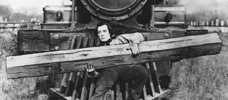
The General
1926 -
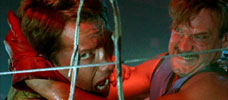
The Running Man
1987 -

Guns
1990 -
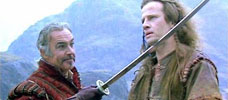
Highlander
1986 -
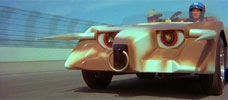
Death Race 2000
1975 -
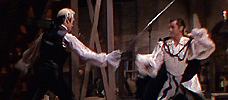
Scaramouche
1952 -
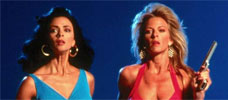
Do or Die
1991 -
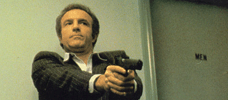
Thief
1981 -

Mission: Impossible
1996 -
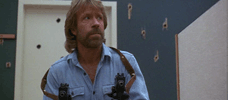
Invasion U.S.A.
1985 -

Rambo: First Blood Part II
1985 -

Bullitt
1968 -

Hard Hunted
1992 -
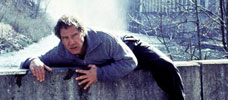
The Fugitive
1993 -
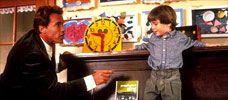
Kindergarten Cop
1990 -
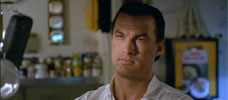
Under Siege
1992 -
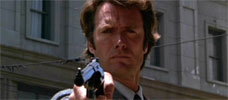
Dirty Harry
1971 -
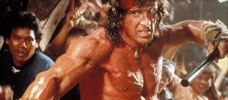
Rambo III
1988 -
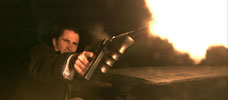
Public Enemies
2009 -
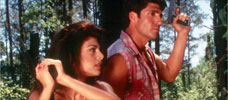
Day of the Warrior
1996 -

The Good, the Bad, the Weird
2008 -
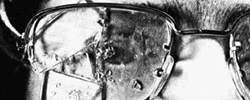
Straw Dogs
1971 -
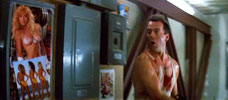
Die Hard
1988 -
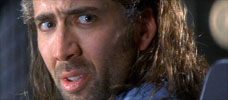
Con Air
1997 -

Collateral Damage
2002 -
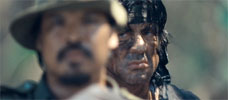
Rambo
2008
We don’t do comments anymore, but you may contact us here or find us on Twitter or Facebook.



